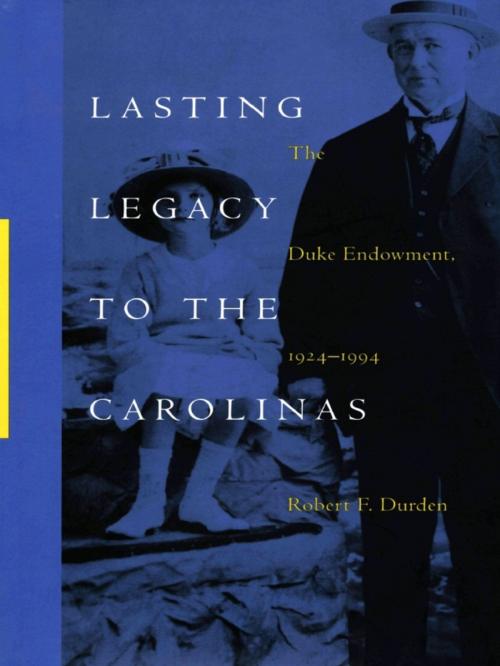Lasting Legacy to the Carolinas
The Duke Endowment, 1924–1994
Nonfiction, Social & Cultural Studies, Social Science, Philanthropy & Charity, Business & Finance, Industries & Professions, Nonprofit Organizations & Charities, History, Americas, United States| Author: | Robert F. Durden | ISBN: | 9780822397120 |
| Publisher: | Duke University Press | Publication: | July 2, 1998 |
| Imprint: | Duke University Press Books | Language: | English |
| Author: | Robert F. Durden |
| ISBN: | 9780822397120 |
| Publisher: | Duke University Press |
| Publication: | July 2, 1998 |
| Imprint: | Duke University Press Books |
| Language: | English |
Like the majority of the founders of large philanthropic foundations in the United States, James B. Duke assumed that the Duke Endowment, which he established in 1924, would continue its charitable activity forever. Lasting Legacy to the Carolinas is an examination of the history of this foundation and the ways in which it has—and has not—followed Duke’s original design.
In this volume, Robert F. Durden explores how the propriety of linking together a tax-free foundation and an investor-owned, profit-seeking business like the Duke Power Company has significantly changed over the course of the century. Explaining the implications of the Tax Reform Act of 1969 for J. B. Duke’s dream, Durden shows how the philanthropist’s plan to have the Duke Endowment virtually own and ultimately control Duke Power (which, in turn, would supply most of the Endowment’s income) dissolved after the death of daughter Doris Duke in 1993, when the trustees of the Endowment finally had the unanimous votes needed to sever that tie. Although the Endowment’s philanthropic projects—higher education (including Duke University), hospitals and health care, orphan and child care in both North and South Carolina, and the rural Methodist church in North Carolina—continue to be served, this study explains the impact of a century of political and social change on one man’s innovative charitable intentions. It is also a testimony to the many staff members and trustees who have invested their own time and creative energies into further benefiting these causes, despite decades of inevitable challenges to the Endowment.
This third volume of Durden’s trilogy relating to the Dukes of Durham will inform not only those interested in the continuing legacy of this remarkable family but also those involved with philanthropic boards, charitable endowments, medical care, child-care institutions, the rural church, and higher education.
Like the majority of the founders of large philanthropic foundations in the United States, James B. Duke assumed that the Duke Endowment, which he established in 1924, would continue its charitable activity forever. Lasting Legacy to the Carolinas is an examination of the history of this foundation and the ways in which it has—and has not—followed Duke’s original design.
In this volume, Robert F. Durden explores how the propriety of linking together a tax-free foundation and an investor-owned, profit-seeking business like the Duke Power Company has significantly changed over the course of the century. Explaining the implications of the Tax Reform Act of 1969 for J. B. Duke’s dream, Durden shows how the philanthropist’s plan to have the Duke Endowment virtually own and ultimately control Duke Power (which, in turn, would supply most of the Endowment’s income) dissolved after the death of daughter Doris Duke in 1993, when the trustees of the Endowment finally had the unanimous votes needed to sever that tie. Although the Endowment’s philanthropic projects—higher education (including Duke University), hospitals and health care, orphan and child care in both North and South Carolina, and the rural Methodist church in North Carolina—continue to be served, this study explains the impact of a century of political and social change on one man’s innovative charitable intentions. It is also a testimony to the many staff members and trustees who have invested their own time and creative energies into further benefiting these causes, despite decades of inevitable challenges to the Endowment.
This third volume of Durden’s trilogy relating to the Dukes of Durham will inform not only those interested in the continuing legacy of this remarkable family but also those involved with philanthropic boards, charitable endowments, medical care, child-care institutions, the rural church, and higher education.















